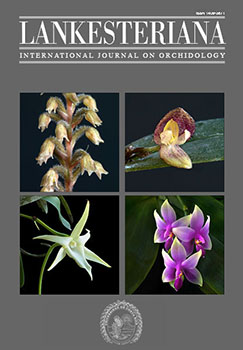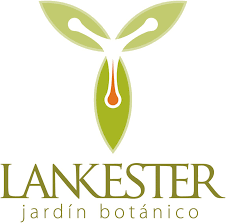<i>Pachygenium muyscarum</i> (Spiranthinae), a new species from the subxerophitic enclaves from the Eastern Range of Colombia
DOI:
https://doi.org/10.15517/lank.v23i1.53886Palabras clave:
flora de Bogotá, flora de Cundinamarca, orquídeas terrestres altoandinas, PelexiaResumen
Pachygenium muyscarum, una especie nueva de Colombia, es descrita, ilustrada y se discuten aspectos relacionados con su ecología, estado de conservación y relaciones con especies morfológicamente similares. Esta especie se caracteriza por florecer sin hojas, labelo de 1.4–1.6 cm de longitud, de ápice trilobulado y glándulas de néctar del labelo de 0.2–0.4 cm de longitud, subuladas y uncinadas. A la fecha, esta especie es la única representante del género en Colombia y es endémica de los enclaves subxerofíticos de Cundinamarca.
Descargas
Citas
Balogh, P. (1982). Generic redefinition in subtribe Spiranthinae (Orchidaceae). American Journal of Botany, 69, 1119−1132.
Boeckeler, J. O. (1869). Rhynchospora nervosa. In: E. Warming (Ed.), Symbolae ad flora brasiliae centralis cognoscendam. Videnskabelige Meddelelser fra Dansk Naturhistorisk Forening i Kjøbenhavn (pp. 9−13, 125–159). Kjöbenhavn: Naturhistoriske Forening i Kjöbenhavn.
Cassini, A. H. G. (1822). Laennecia gnaphalioides. In: G.F. Cuvier (Ed.), Dictionnaire des Sciences Naturelles (pp. 92−93). Strasbourg: F. G. Levrault.
Chase, M. W., Cameron, K. M., Freudenstein, J. V., Pridgeon, A. M., Salazar, G. A., van den Berg, C. & Schuiteman, A. (2015). An updated classification of Orchidaceae. Botanical Journal of the Linnean Society, 177, 151−174. doi: https://doi.org/10.1111/boj.12234
Choisy, J. D. (1821). Hypericum brevistylum. In: J. D. Choisy (Ed.), Prodromus d'une monographie de la famille des hypéricinées (pp. 51). Genève: J. J. Paschoud.
Cruden, R. W. (1981). New Echeandia (Liliaceae) from Mexico. Sida, 9(2), 146.
De Candolle, A. P. (1825). Desmodium molliculum. In: A. L. P. P. De Candolle (Ed.), Prodromus Systematis Naturalis Regni Vegetabilis vol. 2 (pp. 331). Paris, France: Treuttel & Würtz.
De Candolle, A. P. (1847). Stenandrium dulce. In: A. L. P. P. De Candolle (Ed.), Prodromus Systematis Naturalis Regni Vegetabilis vol. 11 (pp. 282). Paris, France: Victor Masson.
De Queiroz, K. (2007). Species concepts and species delimitation. Systematic Biology, 56, 879−886. doi: https://doi.org/10.1080/10635150701701083
Dueñas Gómez, H.C. & Fernández-Alonso, J.L. (2007). Sinopsis de la subfamilia Spiranthoideae (Orchidaceae) en Colombia, parte I. Revista de la Academia Colombiana de Ciencias, 31, 5−27.
Dueñas Gómez, H.C. Fernández-Alonso, J.L. (2009). Sinopsis de la subfamilia Spiranthoideae (Orchidaceae) en Colombia, parte II. Revista de la Academia Colombiana de Ciencias, 33, 157−181.
Franklin, H. J. (1913). The Bombidae of the New World (Continued). Transactions of the American Entomological Society, 39(2), 73–200. http://www.jstor.org/stable/25076909
Garay, L. A. (1982). A generic revision of the Spiranthinae. Botanical Museum Leaflets of Harvard University, 28, 277−425.
Hieronymus, G. H. E. W. (1900). Selaginella sellowii. In: G. Hieronymus (Ed.), Sellaginelarum peces. novae. Hedwigia, 39, 306.
IUCN. (2019). Guidelines for using the IUCN Red List Categories and Criteria. Version 14. Prepared by the Standards and Petitions Subcommittee. Retrieved from http://www. iucnredlist.org/documents/RedListGuidelines.pdf [Accessed June 2021].
Jacquin N. (1760). Dodonaea viscosa. In: N. Jacquin (Ed.), Enumeratio Systematica Plantarum, quas in insulis Caribaeis (pp. 19). Switzerland: Inter Documentation Company AG. Zug.
Kunth (1817). Euphorbia orbiculata. In: F.W.H.A. Humboldt, A.J.A. Bonpland & K.S. Kunth, Nova Genera et Species Plantarum (quarto ed.) (pp. 52). Paris: Sumptibus Librariæ Græco-Latino-Germanicæ.
Kunth (1818). Bidens andicola. In: F.W.H.A. Humboldt, A.J.A. Bonpland & K.S. Kunth, Nova Genera et Species Plantarum (quarto ed.) (pp. 186). Paris: Sumptibus Librariæ Græco-Latino-Germanicæ.
León Linares, J., Guio Blanco, C., Lozano Zafra, D., Fierro Morales, J., Barreto Gutiérrez, L., Quintero Chavarría, E., Pinto Zarate, J., Sierra Salamanca, C., Cortés Pardo, M., Valdivieso Bohórquez, G., Villamil, E., Barrera, M. I. & Gaviria Melo, S. Caracterización de aspectos hidrogeológicos de suelos y rocas del ecosistema de subxerofitia Andina de Cerro Seco, Bogotá, Colombia. Corporación Geoambiental Terrae. unpubl. data.
Lindley J. (1826). Pelexia. In: S. Edwards (Ed.), Botanical Register; consisting of coloured of exotic plants cultivated in British Gardens: with their history and mode of treatment 12 (pl. 985). London: James Ridgway.
Linnaeus (1753). Anthoxanthum odoratum. In: Linnaeus (Ed.), Species Plantarum vol 1 (pp. 28). Holmiae: Impensis Laurentii Salvii.
McDade, L. A. (1995). Species concepts and problems in practice: insight from botanical monographs. Systematic Botany, 20, 606−622. doi: https://doi.org/10.2307/2419813
Molvray, M. & Kores, P.J. (1995). Character analysis of the seed coat in Spiranthoideae and Orchidoideae, with special reference to the Diurideae (Orchidaceae). American Journal of Botany, 82(11), 1443−1454.
Ooststroom, S. J. V. (1934). Evolvulus bogotensis. In: S. J. V. Ooststroom (Ed.), A monograph of the genus Evolvolus. Mededeelingen van het Botanisch Museum en Herbarium van de Rijks Universiteit te Utrecht, 14, 89.
Paula-Souza, J. D. & Ballard Jr, H. E. (2014). Re-establishment of the name Pombalia, and new combinations from the polyphyletic Hybanthus (Violaceae). Phytotaxa, 183(1), 1−15. doi: https://doi.org/10.11646/phytotaxa.183.1.1
Pohl, R. W. (1990). Nassella mucronata. In: M.E. Barkworth (Ed.), Nassella (Gramineae, Stipeae): revised interpretation and nomenclatural changes. Taxon, 39(4), 611. doi: https://doi.org/10.2307/1223366
Presl, C.B. (1827). Sarcoglottis. In: C.B. Presl (Ed.), Reliquiae Haenkeanae, seu, Descriptiones et icones plantarum quas in America Meridionali et Boreali vol. 1, part 2. (pp. 85–148). Prague: Apud J. G. Calve.
Ruiz, H. & Pavon J. A. (1794). Cuphea ciliata. In: H. Ruiz & Pavon J. A (Eds), Florae Peruvianae, et Chilensis Prodromus, t. 11 (pp. 66). Madrid: Typis Gabrielis de Sancha.
Ruiz, H. & Pavon J. A. (1798). Flora Peruviana, et Chilensis 1 (pp. 5). Madrid: Typis Gabrielis de Sancha.
Rutkowski, P., Szlachetko, D.L., Gorniak, M. (2008). Phylogeny and taxonomy of the subtribed Spiranthinae, Stenorrhynchidinae and Cyclopogoniae (Spiranthinae, Orchidaceae) in Central and South America. Poland: Wydawnictwo Uniwersyteu Gdanskiego.
Salazar, G. A. (2003). Pelexia. In: A. M. Pridgeon, Cribb, P. J., Chase, M. W., Rasmussen, F. N. Genera Orchidacearum vol. 3: Orchidoideae part 2, Vanilloideae (pp. 232−236). Oxford: Oxford University Press.
Salazar, G. A., Batista, J. A. N., Cabrera, L. I., van den Berg, C., Whitten, W. M., Smidt, E. C., Buzatto, C. R., Singer, R. B., Gerlach, G., Jiménez-Machorro, R., Radins, J. A., Insaurralde, I. S., Guimarães, L. R. S., de Barros, F., Tobar, F., Linares, J. L., Mújica, E., Dressler, R. L., Blanco, M. A., Hágsater, E., Chase, M. W. (2018). Phylogenetic systematics of subtribe Spiranthinae (Orchidaceae, Orchidoideae, Cranichideae) based on nuclear and plastid DNA sequences of a nearly complete generic sample. Botanical Journal of the Linnean Society, 186, 273−303. doi: https://doi.org/10.1093/botlinnean/box096
Schlechter, R. (1920a). Versuch einer systematischen Neuordnung der Spiranthinae. Beihefte zum Botanischen Centralblatt, 37(2), 317−454.
Schlechter, R. (1920b). Beihefte zum Botanischen Centralblatt. Zweite Abteilung, Systematik, Pflanzengeographie, angewandte Botanik, 37(3), 370–371.
Singer, R.B. & Sazima M. (1999). The pollination mechanism in the ‘Pelexia alliance’ (Orchidaceae: Spiranthinae). Botanical Journal of the Linnean Society, 131, 249–262. doi: https://doi.org/10.1111/j.1095-8339.1999.tb00768.x
Smith, J. (1854). Myriopteris myriophylla. In: B.C. Seeman (Ed.), The Botany of the Voyage of H.M.S. Herald (pp 233, 340). London: Lovell Reeve.
Sprengel, C. (1826). Systema Vegetabilium, editio decima sexta 3: 704.
Szlachetko, D. L. (1993). Three new species of the genus Pelexia (Orchidaceae, Spiranthinae) from Colombia. Rhodora, 95, 277−284.
Szlachetko, D.L., González, R., Rutkowski, P. (2001). Pachygenium, a new genus of the subtribe Cyclopogoninae (Orchidaceae). Polish Botanical Journal, 46, 3−6.
Szlachetko, D.L., Rutkowski, P. & Mytnik, J. (2005). Contributions to the taxonomic revision of the subtribes Spiranthinae, Stenorrhynchidinae and Cyclopogoninae (Orchidaceae) in Mesoamerica and the Antilles. Polish Botanical Studies, 2, 3−387.
Thiers, B. (2022) [continuously updated]. Index Herbariorum: A global directory of public herbaria and associated staff. New York Botanical Garden’s Virtual Herbarium. Retrieved from http://sycamore.nybg.org/science/ih
Wiens, J.J. & Servedio M. R. (2000). Species delimitation in systematics: inferring diagnostic differences between species. Proceedings of the Royal Society B, 267, 631−636.

Descargas
Publicado
Cómo citar
Número
Sección
Licencia
Derechos de autor 2023 Lankesteriana: International Journal on Orchidology

Esta obra está bajo una licencia internacional Creative Commons Reconocimiento-NoComercial-SinObraDerivada 3.0.
Conforme con las Políticas de Acceso Abierto promovidas por la Universidad de Costa Rica, los derechos de autor de todos los artículos publicados en Lankesteriana se encuentran bajo una licencia Creative Commons y pueden ser descargados gratuitamente. Los derechos de autor y de publicación pertenecen a la revista bajo la licencia CC BY-NC-ND 3.0 CR.
Before the publication of the materials submitted by the author(s) in LANKESTERIANA, the author(s) hereby assign all rights in the article to the Lankester Botanical Garden.




